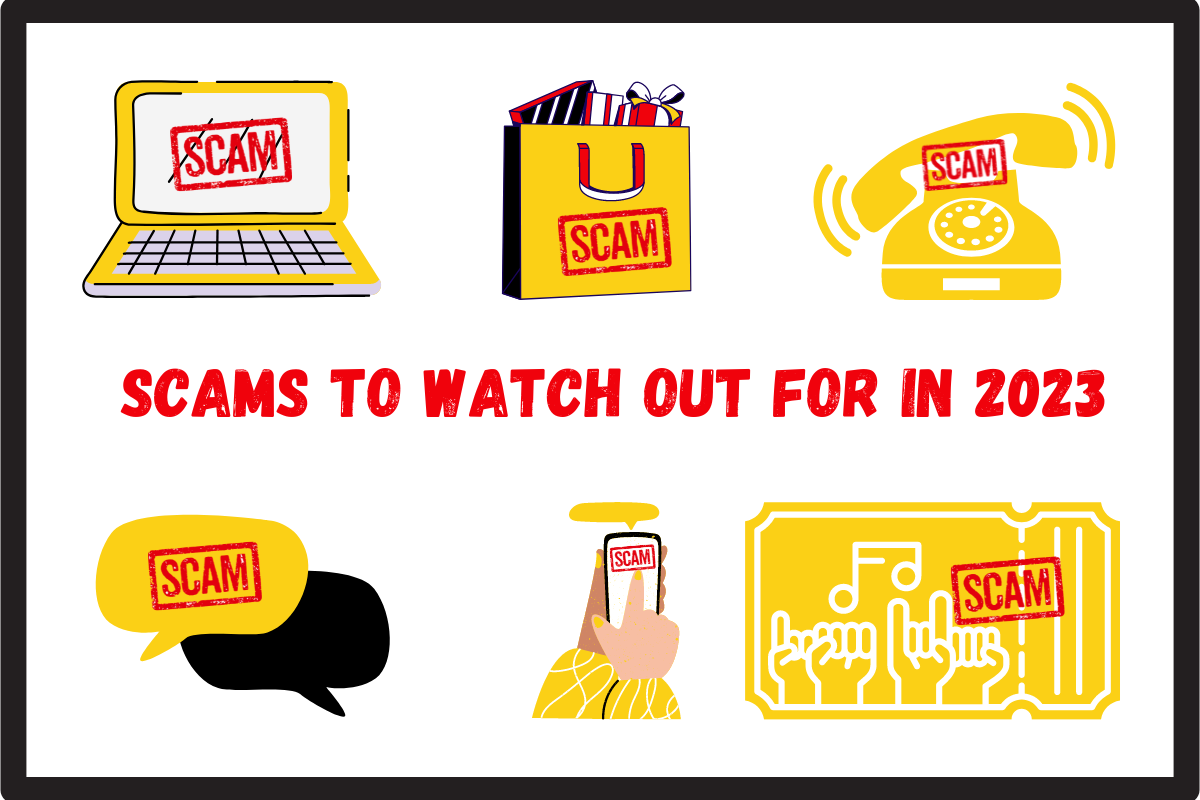 |
|
What scams do we expect to see in 2023?
COST OF LIVING SCAMS
The pressures of the Cost of Living crisis has us all watching every penny, but it also an ideal opportunity for fraudsters to exploit. We know that times of distress and disruption are a magnet for scammers, and sadly right now is no different. Criminals have increasingly sought to scam people by targeting the cost of living crisis, and this is likely to continue, and evolve. We are sure to see more energy rebate scams, as well as fraudsters posing as organisations offering you a “better deal”. With more support set to be paid out by the Government in 2023, you can expect the fraudster to use this to their advantage. Beware of texts, emails and calls from anyone asking you to apply.
PURCHASE SCAMS
Linked in part to the cost of living crisis, in that we are of course all looking for whatever we need at a bargain price. Unfortunately this is where the criminals come into their own. Fraudsters sell non-existent products at discounted prices to attract buyers. The victim intentionally makes a payment, but for products which do not exist and will never arrive.
Do some research to find out what a fair or competitive price is for similar goods in the same condition; if the offer sounds too good to miss out on, it might not really exist, be fake or of inferior quality.
Research sellers. Check the seller’s history and feedback from other customers, and when on social media, beware of accounts that may have been set up very recently. Fraudsters often use stock images or other people’s images, or use the same image on multiple websites/adverts. You can use reverse imaging websites to check if they have been used elsewhere.
EVENT FRAUDS
With any major event there will be fraudsters that use it to appeal to those wanting to attend or those wanting to purchase related merchandise.
This year we see some big sporting events such as the 2023 Fifa Women’s World Cup in Australia and New Zealand, and the 2023 Rugby World Cup in France. More and more concerts, gigs and musical comebacks are being announced for 2023, and so whether you are into darts, hockey, rugby, cricket or racing, or you plan to watch your favourite band, the fraudsters plan to be at the front of the crowd trying to steal your money or personal details.
This year will also see the King’s Coronation. Much like with the Queen’s Jubilee we expect to see scam emails and website adverts for offers using the event for fake promotions. This might be fake restaurant offers to get you to part with your personal details or adverts for non-existent merchandise.
When it comes to attending any event, only buy tickets from the venue’s box office, the promoter, an official agent or a well-known and reputable ticket exchange site. Should you choose to buy tickets from an individual (for example on eBay or on a social media), never transfer the money directly into their bank account but use a secure payment site such as PayPal.
Scammers will list a hotel room or accommodation that isn’t available or doesn’t exist. Often victims only realise it’s a scam when they arrive at their destination, by which time the fraudster is long gone. Research the property yourself. See if it has its own website. Always try to call the owner of the property to confirm they know about your potential booking. If you can’t see a phone number, send an email asking for it.
PHISHING, IMPERSONATION SCAMS AND HACKING
On top of all the above, we will continue to be awash with phishing attempts, and fraudsters impersonating well know organisation or individuals, whether via emails, text messages or on the phone. Social Media hacking will be a favourite of the criminals because once they are into an account, they have a list of friends, family and connections that may be easily duped with a message from someone they think they know.
PROTECT YOURSELF
Scams come in all shapes and sizes and the above list is far from exhaustive of what the criminals plan to use to get hold of your money this year. So what can you do to protect yourself in the next 12 months and beyond?
Be sceptical when someone contacts you, especially when it is out of the blue. If you’re a customer of the company use the contact details given to you in official paperwork or on their website to check if the person approaching you is legitimate.
Never give out personal information. This can be used to steal your identity and access accounts. In particular, you should never share your full PIN or password with anyone. Your bank will ask you to use a card reader or ask for a few digits of your password if they need it.
Lock down your privacy settings on social media. Have a look at your settings and hide any personal details from anyone that might be prying. Consider whether you need to have your profile publicly viewable. Enable two-factor authentication. This is a security feature that helps protect your social media accounts. You'll be asked to enter a special login code or confirm your login attempt each time someone tries accessing your account from a browser or mobile device that the platform does not recognise.
Make sure all your accounts have strong passwords and keep operating system and virus protection software up-to-date.
Take five!
Think, is it too good to be true?
Research, research and research some more.
Check, check and check again.
If you spot a scam, report it!
|
|
 |
We’ve had reports that Nottingham Knockers were calling at properties in Stowmarket on Monday night, and our colleagues at Norfolk County Council Trading Standards also report that Nottingham Knockers were in Diss on Sunday evening.
They may still be in the area, or could have moved on elsewhere in the County.
These individuals are claiming to have been in prison and are on a youth offending scheme, attempting to mend their ways. The individuals go on to then try and sell the householder everyday household products at very high prices.
Trading Standards always advise residents to refrain from buying at the doorstep and not to buckle to pressure from salespeople offering supposedly one-off ‘buy it now’ low prices.
These Nottingham Knockers work in groups across the country but they are not involved in any officially recognised offender rehabilitation programme and many do not possess Pedlar’s Certificates, which are issued by police.
If you are approached at the door, please refuse to buy.
Report all doorstep callers to us via Citizens Advice Consumer Service on 0808 223 1133.
Please share on Facebook |
|
 |
|
We have had reports of residents in Long Melford receiving telephone calls from an individual claiming to be from "the Council". The caller goes on to request bank details from the resident so that "Council Tax refunds" can be issued.
Your local Borough or District Council would never ring a resident to ask for their bank details to issue a refund. If an overpayment had been made, and a refund is due, they would either refund the money directly if it had been paid by direct debit, or send a credit notice to the bill payer's address.
If you receive a similar call, please hang up and do not provide the caller with any personal details.
If you have given a scammer any financial information, please contact your bank immediately.
Report all scam calls to us via Citizens Advice Consumer Service on 0808 223 1133.
|
|
 |
|
Suffolk Trading Standards Imports Surveillance Team have detained 68 mole removal laser pens due to the risk of causing skin burns and blindness.
The consignment arrived at the Port of Felixstowe in November, where it was sampled and sent to a test house for assessment. The product was being listed on Amazon, and has since been removed from sale.
The product was tested in accordance with the Electrical Equipment (Safety) Regulations 2016 and found to be unsafe: out of the 8 classifications for laser products, the power output of the multiple samples taken were not consistent, ranging from Class 3B to Class 4, both of which are the two highest classes and are restricted to only being operated by users with adequate training. This was clear due to the peak power range of the samples taken being capable of causing skin burns and blindness.
The manual with the product failed to provide any safety labelling for how to use the product or any potential risks of misuse.
Typically, lasers of this class have a key control or a code to make sure the product is only used by those with adequate training. As the product only had a button to activate it, the lack of any safety measure means the product proves an even greater risk of being used accidentally and causing harm to individuals.
The product was also provided with protective goggles, which did not meet the requirements of the Personal Protective Equipment (Enforcement) Regulations 2018 as they were not clearly marked indicating whether they are suitable for use with the laser.
If you have purchased a product that you think may be unsafe, stop using it immediately and report it to Trading Standards via Citizens Advice Consumer Service on 0808 223 1133.
|
|
 |
|
With Veganuary in full swing, we want to remind consumers that they should not rely on a ‘vegan’ logo if they have milk, fish, crustacean, mollusc and/or egg food allergies.
There is no legal definition of vegan, which means that foods labelled vegan are not always completely free of animal products due to unintentional cross-contact with allergenic ingredients of animal origin.
If you have food allergies to milk, eggs, fish, crustaceans, or molluscs, read the ingredients list carefully and look out for labels with warnings such as “may contain”.
Allergen’-Free & vegan are separate claims. Each communicates different information and are aimed at different consumer groups. Only ‘Allergen’-Free claims can be used as food safety information by consumers.
If you have an allergy, please always make the business aware when ordering food, and always check the labels of products you buy. Don't interpret vegan as allergen free.
|
|
 |
|
New year, new job?
We’re hiring for a new intelligence analyst who will work with us and our regional colleagues providing analytical support for investigations, and identifying new and emerging threats both at a strategic and tactical level.
Whilst this post is a regional post, it is an opportunity to be based within Suffolk and work closely with the National Trading Standards Intelligence Team (NTSIT) in Ipswich.
The closing date for applications is 17th January.
Find out more about the role here: www.suffolkjobsdirect.org/IntelAnalyst
|
|
 |
|
Iceland Foods is recalling Mars Dessert Bar because it may contain peanuts and egg, which are not mentioned on the label.
As a result of a packaging error, some packs have been incorrectly packed with Snickers Dessert Bar. This means the product is a possible health risk for anyone with an allergy to peanuts and/or an allergy or intolerance to egg.
Mars Dessert Bar
Pack size: 600g
Best before: 23 February 2024
If you have bought the above product and have an allergy to peanuts and/or an allergy or intolerance to egg, do not eat it. Instead, return it to the store from where it was bought for a full refund. For further details or if you have any questions, you can contact the customer care team on 0800 328 0800.
|
|
|